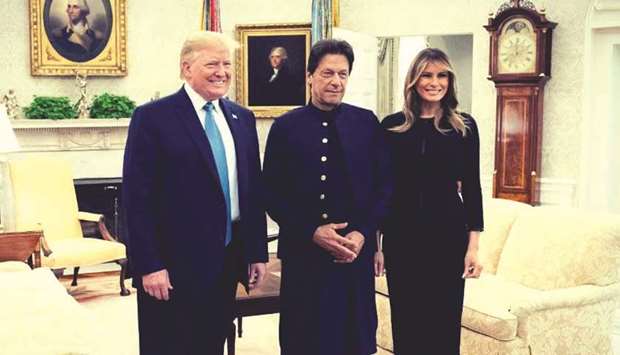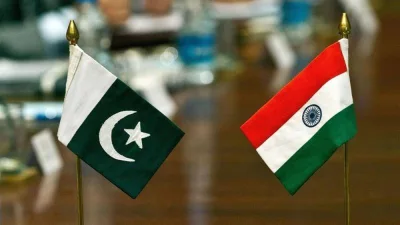Prime Minister Imran Khan has declared that Pakistan will be willing to give up its nuclear weapons if India did the same.
In an interview with Fox News, Khan, who had earlier met US President Donald Trump, was asked how Pakistan would respond if India said it was giving up its nuclear weapons.
“Nuclear war is not an option between Pakistan and India. The idea of nuclear war is actually self-destruction,” said the prime minister.
Pakistan carried out air strikes and shot down two Indian military jets in February, a day after Indian warplanes intruded Pakistan airspace for the first time since a war in 1971, prompting leading powers to urge both of the nuclear-armed countries to show restraint.
Tension had elevated since the Pulwama attack on February 14 in which more than 40 Indian paramilitaries were killed in Indian-administered Kashmir.
Speaking on the recent tensions between the two South Asian neighbours, the prime minister said he had asked President Trump to play his role and mediate between the two countries.
“The US is the most powerful country in the world, the only country which could mediate between Pakistan and India, and resolve the only issue, which is Kashmir,” Khan told Fox News. “The only reason for (why for) 70 years we have not been able to live like civilised neighbours is Kashmir.”
“I really feel that India should come on the table, US could play a big part, and President Trump can certainly play a big part. We are talking about 1.3bn people on this earth,” he added. “Imagine the dividends of peace if somehow that issue could be resolved.”
Answering a question, Khan said that in a possible prisoner swap agreement with the US in future, the exchange of Afia Siddiqui – a Pakistani captured and convicted of attacking US troops in Afghanistan – with Shakil Afridi, the man in custody of Pakistan who led the Americans to Osama bin Laden, leading to his killing, can be discussed.
“It was not talked about today, but in future we know that the US wants Afridi, so we can negotiate … no negotiations have started but with Siddiqui, we could negotiate,” the prime minister said, adding that the possibility of a prisoner swap agreement in future remained a viable option.
Khan also said that Pakistan’s main spy agency provided the US with a lead that helped them find and kill bin Laden.
Pakistan has until now officially denied having any knowledge of the terror chief until he was shot dead in a night time raid by US special forces on May 2, 2011, an incident that was a major national embarrassment and caused ties between the two countries to plummet.
“This is a very emotive issue, because Shakeel Afridi in Pakistan is considered a spy,” he told host Bret Baier.
“We in Pakistan always felt that we were an ally of the US, and if we had been given the information about Osama bin Laden, we should have taken him out.”
Baier then asked if Khan understood the scepticism around the Inter-Services Intelligence agency (ISI) for leaking key information, to which Khan replied: “And yet it was ISI that gave the information which led to the location of Osama bin Laden.
“If you ask the CIA (US Central Intelligence Agency), it was the ISI which gave the initial location through the phone connection.”
It was not immediately clear what Khan was referring to and he did not provide details.
Though Pakistan officially denies knowing that bin Laden was living on its territory, Asad Durrani, a former spymaster, told Al Jazeera in 2015 that the ISI probably knew where he was and hoped to use him as a bargaining chip before he was killed.
The 9/11 mastermind was tracked down after a 10-year manhunt to Abbottabad, a garrison town north of Islamabad where Pakistan’s military academy is headquartered, sparking allegations authorities were colluding with the terror group.
A leaked Pakistani government report in 2013 said bin Laden arrived in Pakistan in the spring or summer of 2002 – after the 2001 US-led invasion of Afghanistan – and settled in Abbottabad in August 2005.
The report, which coined the term “governance implosion syndrome” to explain the extent of official failures to detect him, said he was once stopped for speeding and enjoyed wearing a cowboy hat.
Two former senior Pakistani military officials told AFP in 2015 that a defector from Pakistani intelligence assisted the US in its hunt for bin Laden, but denied the two countries had officially worked together.
To another question, Khan said that any conflict with Iran could lead to regional instability and escalate conflict.
“I can’t say about Iran wanting a nuclear weapon, but as a neighbour of Iran, we certainly hope that this does not become a full blown conflict,” he said.
Meanwhile, during an appearance at the US Institute of Peace in Washington, Khan said that he would try meet with the Taliban in an effort to persuade the group to meet with the Afghan government, as the US seeks to end the nearly 18-year-old war.
“I will meet the Taliban, and I will try my best to get them to talk to the Afghan government,” he said.
Khan said a Taliban delegation had wanted to meet him a few months back but he did not because of opposition from the Afghan government.
The US and the Taliban are getting closer to a deal that is expected to be centred on a US pledge to withdraw troops in exchange for a Taliban promise not to let Afghanistan be used as a base for terrorism, officials say.
However, the Taliban have refused to negotiate with Kabul, denouncing it as a US puppet, but in an effort to foster Afghan reconciliation, a 60-strong delegation of citizens met the Taliban for two days of talks in Qatar.
Pakistan’s role in the peace negotiations is a delicate one.
Afghanistan accuses Pakistan of supporting the Taliban, a charge Pakistan denies, saying that it has suffered heavily from the fighting.
The US has also pressed Islamabad to do more to curb militant groups based in its territory.
Even as talks continue, the Taliban and the government have continued fighting.
Afghan government forces mistakenly killed seven civilians, including children, in an attack on militants south of the capital, a provincial official said on Monday.

US First Lady Melania Trump with US President Donald Trump and Prime Minister Khan at the White House. She posted pictures of herself, Trump and Khan on her Twitter account on Monday. The three met at the White House during the prime minister’s first meeting with the president. Welcoming the prime minister, who is a celebrated former cricket star and philanthropist, Melania wrote: ‘Great to have Prime Minister @ImranKhanPTI of Pakistan at the @WhiteHouse today!’

